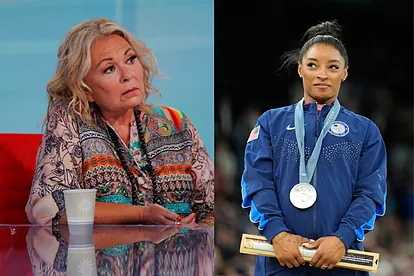Simone Biles Sparks Debate: Roseanne Barr Slams $44,000 Waiver—Fair or Favoritism?

Olympic gymnastics icon Simone Biles has found herself at the center of controversy after receiving a $44,000 waiver, prompting outspoken criticism from actress and comedian Roseanne Barr. The situation has sparked a broader conversation about athlete compensation, fairness, and public perception.
Biles, a seven-time Olympic medalist and arguably the most decorated gymnast in history, reportedly received the waiver as part of a financial arrangement connected to her athletic achievements and endorsements. The $44,000 waiver, which came to light recently, was intended to cover certain expenses related to her participation in elite-level competitions and engagements.
However, the waiver has become a point of contention, with Barr taking to social media and interviews to voice her displeasure. The actress, known for her polarizing and often controversial opinions, questioned the legitimacy of the waiver, implying that Biles was unfairly benefiting from privileges not afforded to others.
“Why should she get a waiver when so many struggling athletes don’t?” Barr stated in a recent post. “This is the kind of inequality that goes unchecked. What message are we sending to young athletes who work just as hard but don’t get this kind of help?”
The criticism sparked a firestorm of debate online. Some sided with Barr, expressing concern about the uneven distribution of resources among athletes, especially those from less prominent sports or lower-income backgrounds. Others quickly defended Biles, pointing out that her historic achievements and global influence warranted such support.
Supporters of Biles argue that her success, coupled with her role as a trailblazer for athletes’ mental health and well-being, makes her deserving of financial assistance. They also highlight the intense pressure and scrutiny she faces as one of the most recognized athletes in the world.
“Simone Biles has inspired millions and brought attention to the need for mental health advocacy in sports. She’s earned everything she’s gotten, and then some,” one social media user remarked in response to Barr’s comments.
Biles herself has yet to directly respond to Barr’s criticism, but she has continued to focus on her gymnastics career and advocacy work. In recent years, she has been a vocal proponent of athlete rights, particularly in areas such as mental health and support for young women in sports.
This latest criticism is not the first time Barr has courted controversy with her opinions. Known for her brash and unfiltered statements, Barr has often waded into political and social debates, sometimes resulting in backlash. In this case, her critique of Biles has reignited conversations about athlete compensation, the role of sponsorships, and the financial realities faced by athletes in various sports.
As the conversation unfolds, it remains to be seen whether Biles will address the criticism or continue to let her accomplishments in gymnastics speak for themselves. Regardless, the incident highlights the complexities and pressures faced by high-profile athletes like Biles in balancing public expectations, financial realities, and their arthletic careers.



